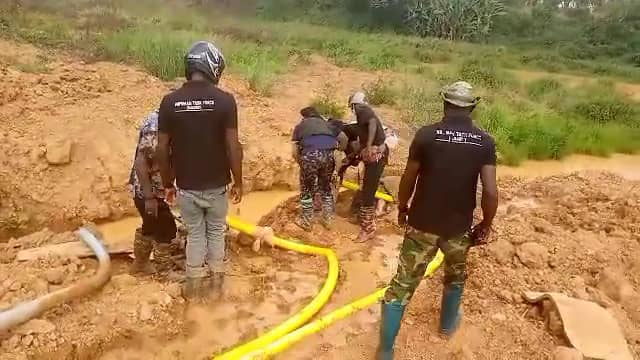This blog is managed by the content creator and not GhanaWeb, its affiliates, or employees. Advertising on this blog requires a minimum of GH₵50 a week. Contact the blog owner with any queries.
Daasebre Dr. Twum Ampofo II, the Nifahene of Okyeman and a member of the Akyem Abuakwa Traditional Council in the Eastern Region, has taken a decisive step to combat illegal mining activities by imposing a total ban on mining in the Asiakwa community and its catchment areas.
He reaffirmed his commitment to supporting the government’s efforts to eradicate illegal mining. This bold move effectively puts all mining activities on hold, demonstrating the chief’s dedication to protecting the environment and preserving natural resources.
By safeguarding the environment, preserving community resources, and backing government initiatives, Daasebre Dr. Twum Ampofo II aims to contribute to sustainable development and responsible resource management.
His actions align with the ongoing efforts of the Okyenhene, Osagyefuo Amoatia Ofori Panin, in combating illegal mining across the Abuakwa Traditional Area. The Akyem Abuakwa Traditional Council has been working tirelessly to protect the Birim River and its surrounding environment from the devastating effects of illegal mining.

In an interview with the media, the Okyeman Nifahene, who also serves as the chief of Asiakwa, condemned mining activities in the area, citing their detrimental impact on the community. He expressed strong disapproval of the miners’ operational methods, describing them as “appalling.”
As a result, Daasebre Dr. Twum Ampofo II has taken decisive action by prohibiting all mining activities and issuing a two-week ultimatum to miners.
During this period, miners are mandated to reclaim the lands, remove all machinery from the site, and vacate the area entirely. This directive aims to protect the environment and ensure the well-being of the community.
Meanwhile, a visit by the media team to various mining sites in Asiakwa revealed mixed compliance with Daasebre Twum Ampofo’s directive.
While some miners had heeded the warning and vacated the premises, others had taken steps to reclaim portions of the land, demonstrating a willingness to adhere to the chief’s instructions. However, the media team also observed that some miners remained defiant, continuing their operations in blatant disregard of the directive. This lack of compliance highlights the ongoing challenges in enforcing the mining ban.
In interviews with operators and miners, they revealed that galamsey (illegal mining) serves as a primary source of livelihood for many, driven by a lack of decent job opportunities in the area.
Despite acknowledging the illegal nature of their activities, the miners emphasized the economic benefits of galamsey, including job creation for the youth and the reduction of social vices. Some miners expressed appreciation for the Asiakwahene’s efforts to safeguard the community’s lands, water bodies, and farmlands. They pledged to reclaim the land within the allotted timeframe and appealed to him to reconsider the blanket ban on mining activities.
The miners urged the government to provide alternative employment opportunities rather than simply revoking their licenses. They emphasized the need for a more constructive approach to facilitate access to legitimate and sustainable jobs, allowing them to maintain their livelihoods while also addressing environmental concerns.
Responding to concerns raised by the miners, Daasebre Dr. Twum Ampofo II acknowledged the economic impact of banning illegal mining. However, he emphasized the importance of responsible mining practices, particularly near river bodies. By promoting sustainable mining methods, he aims to strike a balance between economic needs and environmental protection.
He further highlighted the dangers of the chemicals used in mining, stating that they are highly poisonous and will take a long time to degrade, making it difficult for the land to regain its nutrients for farming and other purposes.
Daasebre Twum Ampofo II reiterated that his directive to reset mining activities in Asiakwa is a forward-thinking move, prioritizing the well-being of both present and future generations. While acknowledging the economic implications of this decision, he remains committed to ensuring that mining activities benefit the entire community, not just a select few.
Credit: Paul Manyo


